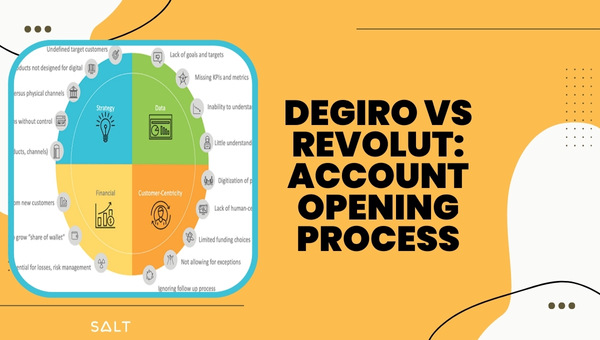Degiro Vs Revolut 2024 [Stocks, Forex Fee, ETF Fees & Tools]
If you're in the market for a digital banking alternative or are looking to manage your investments more effectively, chances are you've come across Degiro and Revolut.
These two financial powerhouses each offer unique benefits and can significantly impact how you handle your finances.
This post will present a detailed comparison of Degiro vs Revolut, guiding you, the discerning consumer, through each platform's strengths and weaknesses.
In this comparative review, you'll learn what these platforms are renowned for: Degiro's investing prowess and Revolut's versatile banking features.
We aim to aid your decision-making by highlighting their features, pricing structures, safety measures, and overall usability.
Skip Ahead
DEGIRO vs Revolut: Overview and Background
In this battle of DEGIRO versus Revolut, understanding your financial needs first will help guide your decision to uncover which platform best suits you.
DEGIRO Overview
DEGIRO is a European brokerage company based in Amsterdam, founded in 2008. It distinguishes itself by offering access to global stock exchanges at lower prices, emphasizing transparency and innovation.
Geared towards investors who know their way around the market, DEGIRO stands out for its expansive range of investment products and exchange trade access.
Revolut Overview
Revolut, on the other hand, started its operations in 2015 as a digital banking alternative headquartered in London.
Despite being relatively new on the scene, it has rapidly expanded its user base by providing a wide range of financial solutions such as currency exchange, budgeting tools, crypto trading, and stock trading.
While both platforms strive to offer their users ease of use and affordability, their services significantly differ. You'd choose DEGIRO if you're more investing-focused and comfortable managing your investments independently.
Also Read: Revolut Review 2024 [Detailed Review By Finance Experts]
You'd lean towards Revolut if you want a comprehensive suite of personal banking tools coupled with light investment options.
DEGIRO vs Revolut: Account Opening Process

This section will provide a detailed comparison between DEGIRO and Revolut, focusing on the account opening process. We'll explore the steps, time, and ease of opening an account with both financial platforms.
DEGIRO Account Opening Process
Opening an account with DEGIRO is a purely online procedure, which you'll appreciate for its efficiency and speed. You can sign up from most countries, excluding several like Canada and Australia, to name a few.
You must complete a suitability test after providing your details (email, address, etc.). Don't sweat it; this helps ensure you understand the inherent risks in investing. Once done, your account will typically be ready within 2-3 business days post verification.
Flooding through pages of terms and agreements is necessary but look for crucial details on fees and services in these sections.
Revolut Account Opening Process
Revolut takes the fast lane on account setups. If you're within the European Economic Area (EEA), Switzerland, or Australia, it'll take just a few minutes—if that—to open your account after downloading the Revolut app.
You'll start by providing your mobile number, following that by uploading a government-issued ID for identity verification purposes. Within minutes of approval—you're set.
Both platforms ask for some personal information to meet regulatory requirements. However daunting this might seem to some—you can rest assured knowing each platform prioritizes security over all else.
DEGIRO vs Revolut: Stock and ETF Fees
This section will compare the Stock and ETF fees between DEGIRO and Revolut. We will scrutinize their pricing structures and evaluate which platform offers more value for money when trading stocks and ETFs.
DEGIRO Stock and ETF Fees
Regarding stock and exchange-traded fund (ETF) fees, DEGIRO has a competitive edge. The platform charges just $2.1 for a US stock transaction versus a UK one, which is $3.4. This fee covers purchase and sale transactions, rendering their pricing structure remarkably cost-efficient.
Costs can add up for frequent traders, but DEGIRO curtails this with a once-per-month free trade offer on select ETFs – a noteworthy cost-saving feature if you're buying and holding rather than fast-paced selling.
Revolut Stock and ETF Fees
Comparatively, Revolut's fees for stock trading are notably higher. For US stocks, the platform charges $5.4 per trade. However, they cap their maximum charge at $7.27, which can benefit high-value deals. Additionally, Revolut applies a minimum fee restriction per deal of only $0.01, ensuring affordability on smaller transactions.
Revolut also offers several free trades each month depending on the account type you have: Standard (3), Premium (8), or Metal (unlimited). Therefore, if you don't trade excessively during a month and plan your transactions carefully around the free deals, trading costs with Revolut can be minimized effectively.
Whether you should choose DEGIRO over Revolut or vice versa will come down to the volume of your trading activity relative to the associated costs on each platform.
Also Read: Binary Options Trading Strategies 2024 [Beginner To Advanced]
DEGIRO vs Revolut: Forex Fees
This section will explore the differences between DEGIRO and Revolut regarding foreign exchange (Forex) fees.
We will analyze the costs associated with each platform's Forex trading services to help you determine which one can provide better value for your investment.
DEGIRO Forex Fees
If you're engaging in foreign exchange (Forex), it's vital to consider the platform's fees. At DEGIRO, the fee for Forex is set at a base cost of 10.00 EUR, supplemented by an additional 0.25% on the transaction.
It's worth noting that this can influence your investment strategy, particularly if you're dealing with lower-value or frequent transactions where cumulative costs can surge.
Revolut Forex Fees
Revolut, on the other hand, operates a slightly different model for its Forex fees. The percentage they charge varies depending upon which type of account you hold with them.
The Standard account is charged at 1%, but Plus plan holders receive a slightly lower rate of 0.5%. For Premium, Metal and Ultra users, the charge is 1.49%.
For small investors or those trading less frequently, Revolut’s relatively low fee percentage could potentially provide an edge over DEGIRO’s more costly base fee, especially when Revolut allows for instantaneous exchange across weekdays and weekends in-app.
DEGIRO vs Revolut: Trading Platforms and Tools

This section will comprehensively compare DEGIRO and Revolut's trading platforms and tools. We will inspect their unique features, user interface, ease of use, stability, and other aspects that shape the overall trading experience for users.
DEGIRO Trading Platform and Tools
DEGIRO offers a web-based platform that leans toward simplicity. The platform scores high for being user-friendly, but don't expect highly advanced features.
Essential tools such as watch lists, account overviews, and order placements are all readily accessible. However, it does fall short in market analysis features compared to other platforms.
A highlight of their service is DEGIRO's 'Information Service.' With this tool, you can set price alerts via email or push notifications, ensuring you're well-informed about your trades as they unfold. This feature can be a game-changer if you juggle other tasks alongside your trading activities.
Revolut Trading Platform and Tools
Revolut’s approach to trading is embedded within its all-in-one sophistic app — which includes banking and trading features. During trades, real-time quotes are provided along with the option to place instant market orders or scheduled orders if you prefer.
One key point of differentiation for Revolut lies in its commodity trading options. It offers stock & ETFs like DEGIRO and provides options for users to trade cryptocurrency and commodities like gold and silver – which expands your financial horizons well beyond the average digital banking application.
The app also flaunts an intuitive interface, making navigation simple for beginners. While DEGIRO keeps things simple yet functional with its web interface complimented by an information service, Revolut brings a comprehensive app that combines banking services and varied investment opportunities under a single platform.
Here are some of their distinctive features at a glance:
DEGIRO:
- Straightforward web-based platform
- Information service providing real-time notifications.
Revolut:
- All-in-one app combining banking services and trading
- Real-time quotes provided during trades
- Options for stock & ETFs, Cryptocurrency, and Commodity trading
Also Read: 11 Tips For Options Trading 2024 [Become A Market Master Now]
DEGIRO vs Revolut: Deposit and Withdrawal
In this section, we will compare the deposit and withdrawal processes of DEGIRO and Revolut. Key topics such as transfer times, fees, payment methods, and the ease of these operations will be covered.
DEGIRO Deposit and Withdrawal
At DEGIRO, the deposit process is straightforward and secure. You'll need to make a bank transfer to your DEGIRO account, which typically goes through within two business days.
However, it's important to note that they don't accept deposits from third parties, so the name on your bank account must match the name on your DEGIRO account.
Withdrawals are similarly uncomplicated - you can withdraw money at any time without incurring a fee. Requesting a retreat is as simple as entering your online platform and selecting 'Transfer.'
Revolut Deposit and Withdrawal
Revolut, on the other hand, provides instant top-ups via credit or debit cards from multiple countries. You can also transfer by bank or set up an automated payment feature for regular contributions or investments. It indeed beats DEGIRO when it comes to convenient deposit methods.
As for withdrawals, there are no specific limitations imposed by Revolut. When you wish to withdraw funds from your Revolut investment account, it's done so using their instant 'sell & move' feature – directly back into your Revolut personal current account, ready for immediate use.
In terms of ease of depositing and withdrawing funds, Revolut has a marked advantage due to its rapid transactional framework designed explicitly for such functionality.
DEGIRO vs Revolut: Customer Service and Support

Now, we'll delve into the customer service provisions of DEGIRO and Revolut. Our focus will be on their response times, communication channels, quality of support, and overall customer satisfaction ratings.
DEGIRO Customer Service and Support
Regarding customer service and support, DEGIRO offers solid avenues for assistance. Their operation hours span from Monday to Saturday, 8 am to 10 pm (CET), and you can contact them through various channels, including phone(+31 20 261 3072) or email.
One standout aspect of DEGIRO's customer service is that they provide local telephone support in several countries, allowing you to receive guidance in your preferred language, a feature not often seen on other platforms.
However, their online help center is a bit lackluster. Although they have a comprehensive FAQ section, finding specific answers can be challenging due to the setup.
While they don't offer live chat support, their responsive team will get back to your query via email within 2-3 business days in most instances.
Revolut Customer Service and Support
Revolut takes a more digital-centric approach to customer service with 24/7 in-app chat support, competitive in today’s digitally driven era.
They are also reachable through social media platforms like Facebook and Twitter, where general inquiries can be sorted swiftly.
Their extensive FAQ section connects you to immediate solutions for common issues without having to reach out directly. However, their drawback seems to be technical issues where response times may lag due to the large volume of users.
In conclusion, both DEGIRO and Revolut prioritize accessibility but approach it differently: DEGIRO has expansive telephone support, whereas Revolut emphasizes efficient digital assistance.
Also Read: Degiro vs Flatex 2024 [Secure Your Financial Future]
DEGIRO vs Revolut: Security and Regulation
This section will delve into a side-by-side comparison of DEGIRO and Revolut regarding security measures and regulations. We will discuss how each platform protects your assets and personal information and the regulatory bodies overseeing their operations.
DEGIRO Security and Regulation
DEGIRO is highly secure and operates under regulatory supervision. Registered with the Netherlands Authority for Financial Markets (AFM), it abides by stringent European regulations.
Furthermore, DEGIRO is also registered with the Dutch Central Bank (DNB) - their transparency extends to sharing all regulatory records publicly.
Regarding fund safety, client funds are kept separate from DEGIRO's capital. They utilize segregated accounts to fulfill a crucial requirement of brokerage firms.
This means your investments are ring-fenced and safe even if DEGIRO were to go bankrupt - your assets being managed entirely separate from the company assets.
Regarding online security, DEGIRO deploys encryption technology for secure data transmission. Clients get access via a two-step login process, further consolidating its security framework.
Revolut Security and Regulation
Revolut adheres to a high level of regulation as well. Authorized by the UK's Financial Conduct Authority (FCA), they abide by standard industry practices.
Revolut's full authorization under the Electronic Money Regulations 2011 also allows them electronic money operations capability across Europe.
Client funds are safeguarded in a segregated account maintained by a tier-one UK bank – separate from Revolut’s operational funds. This replicates what DEGIRO offers in terms of client fund protection.
Regarding online security, Revolut uses data encryption technology similar to DEGIRO. They also employ custom device-based security features that enable users to control their cards virtually - freezing or unfreezing them at will and setting spending limits.
DEGIRO vs Revolut: Product Offerings

It's crucial to understand the options available to you when choosing a platform for trading or investment purposes, and hence, we'll discuss everything from stock trading to ETFs and beyond.
DEGIRO Product Offerings
DEGIRO impresses with its extensive range of products. It offers access to global markets, allowing you to invest in equities, bonds, ETFs, futures, and options across over 50 exchanges worldwide.
DEGIRO is also a stock specialist with an extensive offering that includes penny stocks and OTC. Their diverse product portfolio makes it a favored choice for seasoned investors seeking exposure to different asset classes.
However, for those interested in commodities or Forex trading or looking to put their funds into money markets or mutual funds, DEGIRO might not be the fitting platform. Dedicated commodities trading is noticeably absent from DEGIRO's product offerings.
Revolut Product Offerings
Revolut operates more as a multi-purpose platform that's less about comprehensive investment offerings and more about efficient personal finance management, including some investing components.
The standout element of Revolut’s offering is its ease of currency exchange and international payment processing capabilities.
While Revolut provides access to stock trading and crypto facilities, their range is notably more limited than Degiro – only facilitating investments across US stocks and five cryptocurrencies (Bitcoins, Ethereum, Litecoin, Bitcoin Cash, Ripple).
Overall, if you're aiming for simplicity in daily banking coupled with some investment facilities on the side, Revolut should suit your needs well.
Also Read: 3 Ways To Buy Bitcoin On Cash App In 2024 [Step-by-Step Guide]
DEGIRO vs Revolut: Educational Resources
Now, We will delve into the learning tools they provide to their users, which can benefit those new to investing or looking to expand their knowledge.
DEGIRO Educational Resources
DEGIRO runs a pretty tight ship when it comes to educational resources. They maintain a library of informative articles under their "Knowledge" section - providing insights into various investment topics, market trends, and financial concepts.
If you're stepping into the world of investments, DEGIRO has you covered with a comprehensive glossary explaining the industry terms.
Beyond the articles, DEGIRO also offers a free investor's academy. Here, they present a series of modules to guide users in understanding the financial markets better. This educational approach makes it an ideal platform for novice investors eager to up their game.
Revolut Educational Resources
On the other hand, Revolut's educational resources seem limited in comparison, mainly focusing on its FAQ section and blog posts.
While these posts are well-written and cover various topics - from getting started on the platform to using specific features - they lack depth regarding investing knowledge.
However, one notable advantage Revolut has is its user-friendly interface and simple operation instructions conducive to self-learning.
For true beginners looking for basic understanding along with everyday personal finance management – Revolut could be effective.
FAQs About DEGIRO and Revolut
Is DEGIRO better than Revolut?
Whether DEGIRO or Revolut is better will depend on your specific needs and preferences. Both offer a range of investment options but have different fee structures.
Can I use DEGIRO with Revolut?
Yes, you can transfer funds from your Revolut account to your DEGIRO account to invest.
How trustworthy is DEGIRO?
DEGIRO is generally considered trustworthy and regulated by Dutch and European financial authorities.
Can I buy ETF with Revolut?
Yes, you can buy ETFs and other investments through Revolut.
Can you buy crypto on DEGIRO?
No, currently, cryptocurrency trading is not offered on DEGIRO's platform.
Are my shares safe in DEGIRO?
Yes, shares in DEGIRO are safeguarded by the Dutch Central Bank and are separate from its assets, protecting if the company goes bankrupt.
Conclusion
In summary, both DEGIRO and Revolut offer great value, but their strengths lie in different areas. If you're looking for a more traditional trading environment with robust investment offerings, DEGIRO might be your best bet.
Alternatively, if personal finance management coupled with some investment opportunities in a user-friendly set-up is what you desire, Revolut should perfectly suit that need.
The ultimate decision between DEGIRO and Revolut should depend on your financial goals and banking needs. Always remember - the best choice is the one tailored to you.

Michael Restiano
I support product content strategy for Salt Money. Additionally, I’m helping develop content strategy and processes to deliver quality work for our readers.
